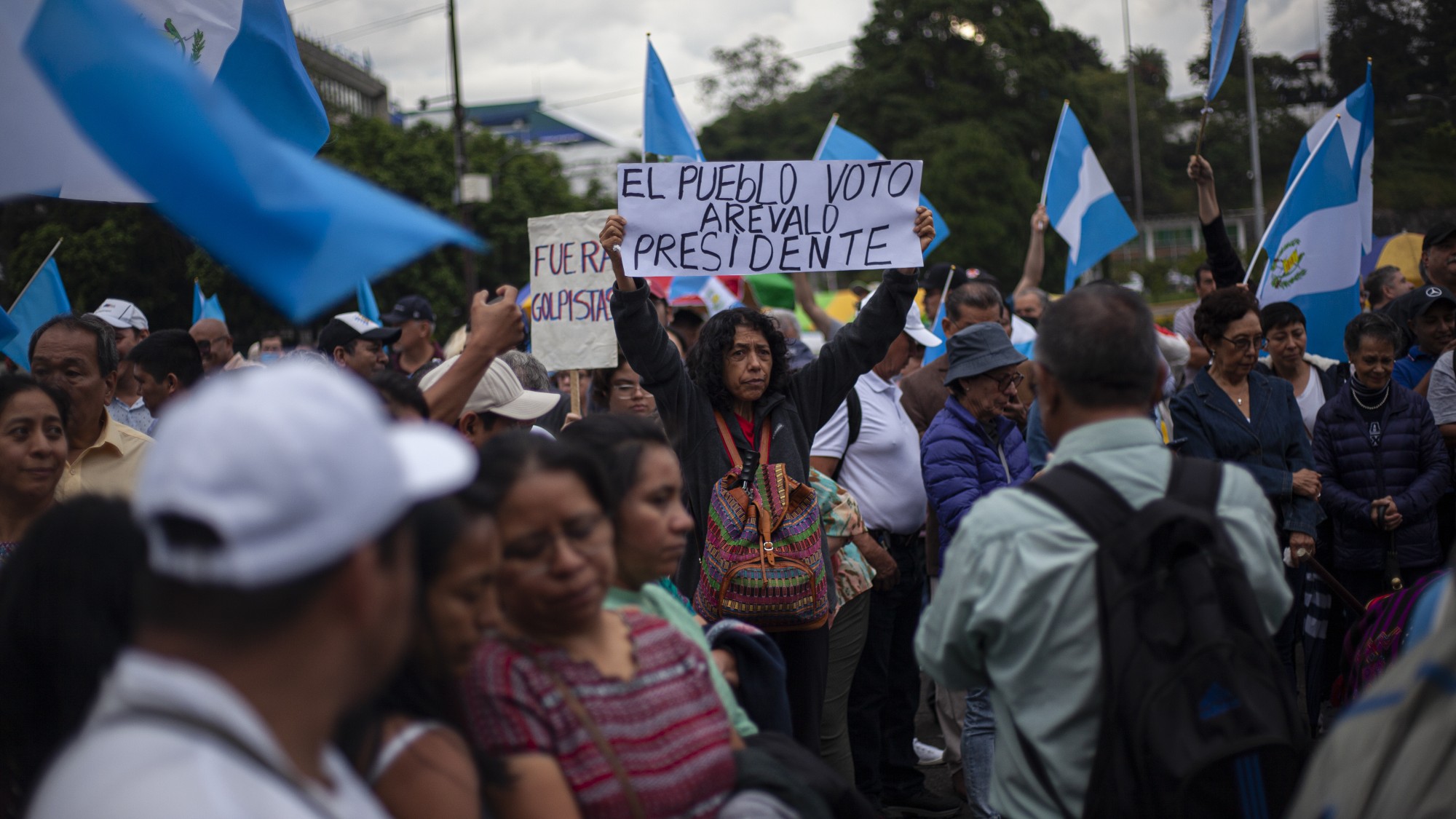Another coup for Guatemala?
Arévalo won a surprise landslide victory, but there have been efforts to stop him taking office

A free daily email with the biggest news stories of the day – and the best features from TheWeek.com
You are now subscribed
Your newsletter sign-up was successful
Is history repeating itself in Guatemala?
Nearly seven decades after the Central American country's first democratically elected government was toppled, there are warnings that the son of Juan José Arévalo, the first president of that historic democratic movement, might suffer the same fate.
Bernardo Arévalo won a surprise landslide victory in the presidential election in August, standing on an anti-corruption platform. But the political turmoil in the country has continued since, with electoral officials suspending his centre-left Semilla party.
Brazil's president Luiz Inácio Lula da Silva warned fellow world leaders last week of the risk of another coup in Guatemala. This was echoed by Francisco Mora, the US ambassador to the Organization of American States, who said Washington was "deeply concerned" by efforts to "undermine democracy" in the country.
The outgoing Guatemalan president Alejandro Giammattei condemned "unnecessary international involvement" in the election and its aftermath, and insisted there would be a peaceful transition. But not everyone is convinced.
Arévalo is due to take office in January but prosecutors are investigating "alleged anomalies in its registration as a party", said France 24. And the conservative National Unity of Hope party, whose candidate Sandra Torres lost the presidential run-off vote to Arévalo, has "continued to make unsubstantiated accusations of irregularities in the vote count", Al Jazeera reported.
International and local observers have refuted the allegations, confirming the election as free and fair. Yet investigations have continued, with police "opening boxes with sealed ballots", Al Jazeera added, prompting "international outcry".
Arévalo has "unleashed the wrath of the country's conservative elite", said María Aguilar for US magazine Jacobin. "According to the calculations of the economic, political, and military elites, conservative sectors that have historically dominated the country, Arévalo’s triumph should not have happened."
Arévalo walks in the long shadow of political turmoil. His father, Juan José Arévalo, led a revolution of his own in 1944 and subsequently won a landslide election victory, making him Guatemala's first democratically elected president. His foray into democracy was short-lived as the "experiment was crushed" by a CIA-orchestrated coup in 1954, Will Freeman wrote for Americas Quarterly. This opened the door to "decades of military rule" before the country transitioned to a civilian government in 1986.
Now Bernardo Arévalo is taking up "the banner of democratic change as his country again slips toward autocracy".
Historically, Guatemalans have shown "among the lowest" level of support for democracy in Latin America, according to the AmericasBarometer survey. But protests in the capital Guatemala City in support of Arévalo last week "suggest that the efforts by some officials to derail his presidency have awakened a new will among many citizens to defend democracy", said The Associated Press.
Arévalo said he has "tried his own legal maneuvers to stop those who want to keep him from power", but he also called on "businesspeople, farmers, Indigenous groups, and workers" to take to the streets to "reject what has been happening".
"What is at stake is not the future of the party," he told AP News. "What is at stake is the reality, the viability of democratic institutions."
A free daily email with the biggest news stories of the day – and the best features from TheWeek.com
The Week
Escape your echo chamber. Get the facts behind the news, plus analysis from multiple perspectives.

Sign up for The Week's Free Newsletters
From our morning news briefing to a weekly Good News Newsletter, get the best of The Week delivered directly to your inbox.
From our morning news briefing to a weekly Good News Newsletter, get the best of The Week delivered directly to your inbox.
Rebekah Evans joined The Week as newsletter editor in 2023 and has written on subjects ranging from Ukraine and Afghanistan to fast fashion and "brotox". She started her career at Reach plc, where she cut her teeth on news, before pivoting into personal finance at the height of the pandemic and cost-of-living crisis. Social affairs is another of her passions, and she has interviewed people from across the world and from all walks of life. Rebekah completed an NCTJ with the Press Association and has written for publications including The Guardian, The Week magazine, the Press Association and local newspapers.
-
 The Olympic timekeepers keeping the Games on track
The Olympic timekeepers keeping the Games on trackUnder the Radar Swiss watchmaking giant Omega has been at the finish line of every Olympic Games for nearly 100 years
-
 Will increasing tensions with Iran boil over into war?
Will increasing tensions with Iran boil over into war?Today’s Big Question President Donald Trump has recently been threatening the country
-
 Corruption: The spy sheikh and the president
Corruption: The spy sheikh and the presidentFeature Trump is at the center of another scandal
-
 What might a Trump victory mean for the global economy?
What might a Trump victory mean for the global economy?Today's Big Question A second term in office for the 'America First' administration would send shockwaves far beyond the United States' shores
-
 Trump’s violent rhetoric: a threat to the US justice system?
Trump’s violent rhetoric: a threat to the US justice system?feature The former president has repeatedly attacked those involved in the criminal cases against him